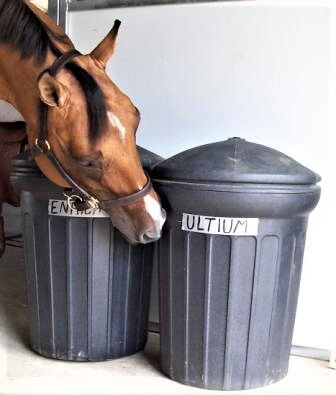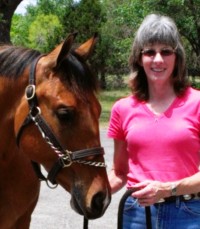Protect Valuables from Theft and Contamination
By Eleanor Blazer
With the ever-increasing price of feed, horse owners are discovering a trip to the feed store almost requires an armed guard. But once the edible “gold” is safely transported to the stable, how is it protected and stored? As with anything of value, there’s a chance it will be stolen. In this case the thieves are usually horses and rodents.

A Room of its Own
Commercial feeds, grain, and supplements must be stored in a secure location. A room, such as an extra stall, with a locking door is best. Within that room, storage containers with lids that can be locked or fastened securely should be provided. This double protection helps ensure thieves will have trouble accessing the treasure.
Several types of containers are available. An old chest freezer with the latch removed (so a child doesn’t become trapped) works well. Other popular containers are trash cans. Galvanized metal trash cans work best, as the steel also deters the other thieves – rodents (rats and mice).
Secure containers also help prevent equine protozoal myeloencephalitis (EPM). Opossums, skunks and raccoons may have the organism which causes EPM in their feces. Horses may acquire EPM when they ingest grain, forage or water contaminated with the feces.
Regardless of the type of container you choose, the lid must fasten securely and be difficult for a horse to remove. There’s always a chance the feed room door will be left open. Bungee cords may help secure the lid.
Storing Surplus
Extra bags of feed that won’t fit in the secure containers may be stacked on a platform a few inches above the ground. A wooden pallet works well and allows air circulation around the bags. It’s imperative that the feed room door is securely closed at all times if exposed feed bags are stored. Horses can be their own worst enemy. It’s up to us to protect them from temptation.
Keep it Fresh
Feed should be purchased fresh every 30 days and rotated. This means the containers should be cleaned completely and the oldest used first.
Prevent Spoilage
High humidity can cause spoilage and increases the possibility of insects. Even feed stored in containers is susceptible to moisture. If the containers are sweating or show signs of condensation, it’s possible the feed will spoil or become contaminated with insects. Ensuring proper ventilation and setting up a fan will help. During the summer, when nights are cool and the days are hot and humid, purchasing and storing less feed at a time is smart.
Stables with 20 or more horses may consider buying feed in bulk. While this can be cost-effective, you still don’t want to store more than a month’s supply at a time. Clean the bulk bin out completely before refilling. Poorly constructed bulk bins allow the buildup of moisture resulting in spoiled feed. This spoiled feed can hang up on the sides and may break loose at any time – contaminating the feed and causing sick horses.
No matter what type of storage you choose, the area must be kept clean. Spilled feed and broken bags will attract unwanted guests.
Check the Date
When buying anything of value, make sure you are buying quality. The feed should not be more than a month old. Don’t be shy at the feed store—you are the customer. Check the date and refuse it if it’s old or does not meet your expectations. Refuse dirty or damaged bags.
Date of manufacturing will be stated on the feed tag, stamped on the bag, or printed on the tear strip along one end of the bag. Many companies use the Julian Date Calendar. For example, if the date code reads: 19121, 19 is the year (2019) 121 is the 121st day of the year (May 1st). Even if the date of manufacture meets your requirements, refuse or return the feed if it seems questionable.
© 2019 The Way of Horses
* Earn Professional Certification as Horse Trainer, Stable Manager or Riding Instructor. All courses are online. Visit www.equinestudiesinstitute.org for information.
Published September 2019 Issue

Eleanor Blazer was raised training and caring for horses. She learned to ride and care for the horses her family bought and sold. Many of these horses required improved nutrition when they arrived for training. Eleanor’s experience and research has benefited both horses and horse lovers in the field of equine nutrition. An equine nutrition consultant, based in Bulverde, Texas, she keeps busy doing equine nutrition consultations, conducting seminars, and speaking to youth groups about horse care and nutrition. Eleanor is the author of the syndicated column The Way of Horses. She has more than 20 years experience helping and being a mentor to those wanting to know how to provide the very best care and nutrition for our special friend – the horse.





